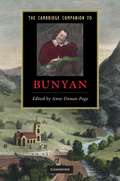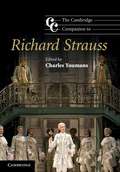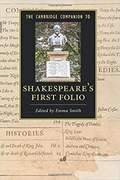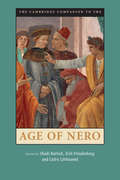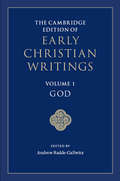- Table View
- List View
The Cambridge Companion to Ballet
by Marion KantBallet is a paradox: much loved but little studied. It is a beautiful fairy tale; detached from its origins and unrelated to the men and women who created it. Yet ballet has a history, little known and rarely presented. These great works have dark sides and moral ambiguities, not always nor immediately visible. The daring and challenging quality of ballet as well as its perceived 'safe' nature is not only one of its fascinations but one of the intriguing questions to be explored in this 2007 Companion. The essays reveal the conception, intent and underlying meaning of ballets and recreate the historical reality in which they emerged. The reader will find new and unexpected aspects of ballet, its history and its aesthetics, the evolution of plot and narrative, new insights into the reality of training, the choice of costume and the transformation of an old art in a modern world.
The Cambridge Companion to Bunyan
by Anne Dunan-Page"John Bunyan was a major figure in seventeenth-century Puritan literature, and one deeply embroiled in the religious upheavals of his times. This Companion considers all his major texts, including The Pilgrim's Progress and his autobiography Grace Abounding. The essays, by leading Bunyan scholars, place these and his other works in the context of seventeenth-century history and literature. They discuss such key issues as the publication of dissenting works, the history of the book, gender, the relationship between literature and religion, between literature and early modern radicalism, and the reception of seventeenth-century texts. Other chapters assess Bunyan's importance for the development of allegory, life-writing, the early novel and children's literature. This Companion provides a comprehensive and accessible introduction to an author with an assured and central place in English literature"--Provided by publisher.
The Cambridge Companion to Greek Tragedy
by P. E. EasterlingAs outspoken in his day as Richard Dawkins or Christopher Hitchens are today, American freethinker and author ROBERT GREEN INGERSOLL (1833-1899) was a notorious radical whose uncompromising views on religion and slavery (they were bad, in his opinion), women's suffrage (a good idea, he believed), and other contentious matters of his era made him a wildly popular orator and critic of 19th-century American culture and public life. As a speaker dedicated to expanding intellectual horizons and celebrating the value of skepticism, Ingersoll spoke frequently on such topics as atheism, freedom from the pressures of conformity, and the lives of philosophers who espoused such concepts. This collection of his most famous speeches includes the lectures: [ "The Gods" (1872) [ "Humboldt" (1869) [ "Thomas Paine" (1870) [ "Individuality" (1873) [ "Heretics and Heresies" (1874)
The Cambridge Companion to Greek and Roman Theatre
by Marianne Mcdonald J. Michael WaltonThis series of essays by prominent academics and practitioners investigates in detail the history of performance in the classical Greek and Roman world. Beginning with the earliest examples of 'dramatic' presentation in the epic cycles and reaching through to the latter days of the Roman Empire and beyond, the Companion covers many aspects of these broad presentational societies. Dramatic performances that are text-based form only one part of cultures where presentation is a major element of all social and political life. Individual chapters range across a two thousand year timescale, and include specific chapters on acting traditions, masks, properties, playing places, festivals, religion and drama, comedy and society, and commodity, concluding with the dramatic legacy of myth and the modern media. The book addresses the needs of students of drama and classics, as well as anyone with an interest in the theatre's history and practice.
The Cambridge Companion to Hans Urs Von Balthasar
by David Moss Edward T. OakesA wide range of theologians outline and assess the work of Hans Urs von Balthasar (1905-1988).
The Cambridge Companion to John Ruskin (Cambridge Companions to Literature)
by Francis O’gormanJDescription Contents Resources Courses About the Authors John Ruskin (1819–1900), one of the leading literary, aesthetic and intellectual figures of the middle and late Victorian period, and a significant influence on writers from Tolstoy to Proust, has established his claim as a major writer of English prose. This collection of essays brings together leading experts from a wide range of disciplines to analyse his ideas in the context of his life and work. Topics include Ruskin's Europe, architecture, technology, autobiography, art, gender, and his rich influence even in the contemporary world. This is the first multi-authored expert collection to assess the totality of Ruskin's achievement and to open up the deep coherence of a troubled but dazzling mind. A chronology and guide to further reading contribute to the usefulness of the volume for students and scholars. Draws together experts from a range of disciplines and contexts to explore John Ruskin's diversity as a polymathic thinker and writer The first multi-authored expert collection to survey the totality of Ruskin's achievement Topics include Ruskin's Europe, architecture, technology, gender, autobiography, art, and his rich influence and relevance
The Cambridge Companion to Medieval English Theatre
by Richard Beadle Alan J. FletcherThe drama of the English Middle Ages is perennially popular with students and theatre audiences alike, and this is an updated edition of a book which has established itself as a standard guide to the field. The Cambridge Companion to Medieval English Theatre, second edition, continues to provide an authoritative introduction and an up-to-date, illustrated guide to the mystery cycles, morality drama and saints' plays which flourished from the late fourteenth to the mid-sixteenth centuries. The book emphasises regional diversity in the period and engages with the literary and particularly the theatrical values of the plays. Existing chapters have been revised and updated where necessary, and there are three entirely new chapters, including one on the cultural significance of early drama. A thoroughly revised reference section includes a guide to scholarship and criticism, an enlarged classified bibliography and a chronological table.
The Cambridge Companion to Medievalism (Cambridge Companions to Culture)
by Louise D’arcensMedievalism - the creative interpretation or recreation of the European Middle Ages - has had a major presence in the cultural memory of the modern West, and has grown in scale to become a global phenomenon. Countless examples across aesthetic, material and political domains reveal that the medieval period has long provided a fund of images and ideas that have been vital to defining 'the modern'. Bringing together local, national and global examples and tracing medievalism's unpredictable course from early modern poetry to contemporary digital culture, this authoritative Companion offers a panoramic view of the historical, aesthetic, ideological and conceptual dimensions of this phenomenon. It showcases a range of critical positions and approaches to discussing medievalism, from more 'traditional' historicist and close-reading practices through to theoretically engaged methods. It also acquaints readers with key terms and provides them with a sophisticated conceptual vocabulary for discussing the medieval afterlife in the modern. Features a historical span of essays from the early modern era to the present, surveying what the Middle Ages has meant to various later periods Ranges across local and national medievalism to colonial and global medievalism, tracing its development from a European to a global phenomenon Examines medievalism through a diversity of media including literature, architecture, music, film and videogames, demonstrating its many forms and broad expressive range
The Cambridge Companion to Modern German Culture
by Eva Kolinsky Wilfried Van Der WillThis Companion provides an authoritative account of modern German culture since the onset of industrialization, the rise of mass society and the nation state. Newly written and researched by experts in their respective fields, individual chapters trace developments in German culture--including national identity, class and race issues and the arts--from the nineteenth century to the present. There is a chronology and guide to further reading. Overall, the Companion offers an invaluable guide to the political and social processes that shaped modern Germany.
The Cambridge Companion to Modern Italian Culture
by Zygmunt G. Baranski Rebecca J. WestThis book provides a comprehensive account of the culture of modern Italy. Specially-commissioned essays by leading specialists focus on a wide range of political, historical and cultural questions. The volume provides information and analysis on such topics as regionalism, language, social and political cultures, the Church, feminism, organized crime, literature, art, the mass media, and music. Each essay contains suggestions for further reading on the topics covered. The Cambridge Companion to Modern Italian Culture is an invaluable source of materials for courses on all aspects of modern Italy.
The Cambridge Companion to Modern Latin American Culture
by John KingThe term Latin America refers to the Portuguese and Spanish-speaking states created in the early 1820s following the wars of independence, states that differed enormously in geographical and demographical scale, ethnic composition and economic resources, yet shared distinct historical and cultural traits. Specially-commissioned essays by leading experts explore the unity and diversity of the region's cultural expressions. These essays analyse history and politics from the nineteenth century to the present day and consider the heritage of pre-Columbian and Colonial Latin America. There is a particular focus on narrative as well as on poetry, art and architecture, music, cinema, theatre, and broader issues of popular culture. A final chapter looks at the strong and rapidly expanding influence of latino/a culture in the United States. A chronology and guides to further reading are included, making this volume an invaluable introduction to the rich and varied culture of modern Latin America.
The Cambridge Companion to Modern Spanish Culture
by David T. GiesThis book offers a comprehensive account of modern Spanish culture from its beginnings in the Revolution of 1868 to the present day. Specially-commissioned essays by leading experts analyze the historical and political background of modern Spain, the culture of major regions including Castile, Catalonia, and the Basque Country, and the country's literature. There are studies of painting, sculpture, architecture, cinema, dance, music, and the modern media. A chronology and guides to further reading assist in making the volume an invaluable introduction to the politics, literature and culture of modern Spain.
The Cambridge Companion to Modernism
by Michael LevensonIn The Cambridge Companion to Modernism, ten eminent scholars from Britain and the United States offer timely new appraisals of the revolutionary cultural transformations of the first decades of the twentieth century. Chapters on the major literary genres, intellectual, political and institutional contexts, film and the visual arts, provide both close analyses of individual works and a broader set of interpretive narratives. A chronology and guide to further reading supply valuable orientation for the study of Modernism. Readers will be able to use the book at once as a standard work of reference and as a stimulating source of compelling new readings of works by writers and artists from Joyce and Woolf to Stein, Picasso, Chaplin, H. D. and Freud, and many others. Students will find much-needed help with the difficulties of approaching Modernism, while the essays' original contributions will send scholars back to this volume for stimulating re-evaluation.
The Cambridge Companion to Modernist Culture
by Celia MarshikModernism emerged alongside radical challenges to traditional belief systems, the reorganization of public and private spheres, new modes of visual display, and innovations in recreation and entertainment. This interdisciplinary collection focuses on the diverse inventions, products, pastimes, and creative forms that responded to and inspired American and European literature. This volume explores such wide-ranging subjects as religion, dance, and publishing, thus introducing readers to the diversity of modernist culture. The Companion serves as a valuable resource for both those undertaking the study of modernism for the first time and those seeking to expand their knowledge of modernism's cultural moment.
The Cambridge Companion to Richard Strauss
by Charles YoumansRichard Strauss is a composer much loved among audiences throughout the world, both in the opera house and the concert hall. Despite this popularity, Strauss was for many years ignored by scholars, who considered his commercial success and his continued reliance on the tonal system to be liabilities. However, the past two decades have seen a resurgence of scholarly interest in the composer. This Companion surveys the results, focusing on the principal genres, the social and historical context, and topics perennially controversial over the last century. Chapters cover Strauss's immense operatic output, the electrifying modernism of his tone poems, and his ever-popular Lieder. Controversial topics are explored, including Strauss's relationship to the Third Reich and the sexual dimension of his works. Reintroducing the composer and his music in light of recent research, the volume shows Strauss's artistic personality to be richer and much more complicated than has been previously acknowledged.
The Cambridge Companion to Shakespeare on Stage
by Stanley Wells Sarah StantonThis 2002 Companion is designed for readers interested in past and present productions of Shakespeare's plays, both in and beyond Britain. The first six chapters describe aspects of the British performing tradition in chronological sequence, from the early staging of Shakespeare's own time, through to the present day. Each relates Shakespearean developments to broader cultural concerns and adopts an individual approach and focus, on textual adaptation, acting, stages, scenery or theatre management. These are followed by three explorations of acting: tragic and comic actors and women performers of Shakespeare roles. A section on international performance includes chapters on interculturalism, on touring companies and on political theatre, with separate accounts of the performing traditions of North America, Asia and Africa. Over forty pictures illustrate peformers and productions of Shakespeare from around the world. An amalgamated list of items for further reading completes the book.
The Cambridge Companion to Shakespearean Comedy
by Alexander LeggattThis is an accessible, wide-ranging and informed introduction to Shakespeare's comedies and romances. Rather than taking each play in isolation, the chapters trace recurring issues, suggesting both the continuity and the variety of Shakespeare's practice and the creative use he made of the conventions he inherited. The first section puts Shakespeare in the context of classical and Renaissance comedy and comic theory, the work of his Elizabethan predecessors and the traditions of popular festivity. The second section traces a number of themes through Shakespeare's early and middle comedies, dark comedies and late romances, establishing the key features of his comedy as a whole and illuminating particular plays by close analysis. Individual chapters draw on contemporary politics, rhetoric, and the history of Shakespeare production. Written by experts in the relevant fields, the chapters bring the reader up to date on current thinking and frequently challenge long-standing critical assumptions.
The Cambridge Companion to Shakespeare’s First Folio
by Emma SmithShakespeare's First Folio, published in 1623, is one of the world's most studied books, prompting speculation about everything from proof-reading practices in the early modern publishing industry to the 'true' authorship of Shakespeare's plays. Arguments about the nature of the First Folio are crucial to every modern edition of Shakespeare and thus to every reader or student of the plays. This Companion surveys the critical methods brought to bear on the Folio and equips readers with the tools to understand it and to develop their skills in early modern book culture more generally. A team of international scholars surveys the range of bibliographic, historical and textual material relating to the Folio, its editors, collectors and critical reception. This revealing volume will be of wide interest to scholars of Shakespeare, the history of the book and early modern drama.
The Cambridge Companion to Theatre History
by David Wiles Christine DymkowskiScholars, amateur historians and actors have shaped theatre history in different ways at different times and in different places. This Companion offers students and general readers a series of accessible and engaging essays on the key aspects of studying and writing theatre history. The diverse international team of contributors investigates how theatre history has been constructed, showing how historical facts are tied to political and artistic agendas and explaining why history matters to us. Beginning with an introduction to the central narrative that traditionally informs our understanding of what theatre is, the book then turns to alternative points of view - from other parts of the world and from the perspective of performers in fields such as music-theatre and circus. It concludes by looking at how history is written in the 'democratic' age of the Internet and offers a new perspective on theatre history in our globalised world.
The Cambridge Companion to Victorian and Edwardian Theatre
by Kerry PowellThis 2004 Companion is designed for readers interested in the creation, production and interpretation of Victorian and Edwardian theatre, both in its own time and on the contemporary stage. The volume opens with a brief overview and introduction surveying the theatre of the time followed by an essay contextualizing the theatre within the frame of Victorian and Edwardian culture as a whole. Succeeding chapters examine specific aspects of performance, production, and theatre, including the music, the actors, stagecraft and the audiences themselves; plays and playwriting and issues of class and gender are also explored. Chapters also deal with comedy, farce and melodrama, while other essays bring forward new topics and approaches that cross the boundaries of traditional investigation, including analysis of the economics of theatre and of the theatricality of personal identity.
The Cambridge Companion to Writing of the English Revolution
by N. H. KeebleThis collection of fifteen essays by leading scholars examines the extraordinary diversity and richness of the writing produced in response to, and as part of, the upheaval in the religious, political and cultural life of the nation which constituted the English Revolution. The turmoil of the civil wars fought out from 1639 to 1651, the shock of the execution of Charles I, and the uncertainty of the succeeding period of constitutional experiment were enacted and refigured in writing which both shaped and was shaped by the tumultuous times. The various strategies of this battle of the books are explored through essays on the course of events, intellectual trends and the publishing industry; in discussions of canonical figures such as Milton, Marvell, Bunyan and Clarendon; and in accounts of women's writing and of fictional and non-fictional prose. A full chronology, detailed guides to further reading and a glossary are included.
The Cambridge Companion to the Age of Nero (Cambridge Companions to the Ancient World)
by Kirk Freudenburg Shadi Bartsch Cedric LittlewoodThe age of Nero has appealed to the popular imagination more than any other period of Roman history. This volume provides a lively and accessible guide to the various representations and interpretations of the Emperor Nero as well as to the rich literary, philosophical and artistic achievements of his eventful reign. The major achievements of the period in the fields of literature, governance, architecture and art are freshly described and analysed, and special attention is paid to the reception of Nero in the Roman and Christian eras of the first centuries AD and beyond. Written by an international team of leading experts, the chapters provide students and non-specialists with clear and comprehensive accounts of the most important trends in the study of Neronian Rome. They also offer numerous original insights into the period, and open new areas of study for scholars to pursue.
The Cambridge Companion to the Musical
by William A. Everett Paul R. LairdTracing the development of the musical on both Broadway and in London's West End, this updated Companion continues to provide a broad and thorough overview of one of the liveliest and most popular forms of musical performance. Ordered chronologically, essays cover from the American musical of the nineteenth century through to the most recent productions, and the book also includes key information on singers, audience, critical reception, and traditions. All of the chapters from the first edition remain - several in substantially updated forms - and five completely new chapters have been added, covering: ethnic musicals in the United States; the European musical; Broadway musicals in revival and on television; the most recent shows; and a case study of the creation of the popular show Wicked based on interviews with its creators. The Companion also includes an extensive bibliography and photographs from key productions.
The Cambridge Companion to the Pre-Raphaelites
by Elizabeth PrettejohnThe group of young painters and writers who coalesced into the Pre-Raphaelite movement in the middle years of the nineteenth century became hugely influential in the development not only of literature and painting, but also more generally of art and design. Though their reputation has fluctuated over the years, their achievements are now recognized and their style enjoyed and studied widely. This volume explores the lives and works of the central figures in the group: among others, the Rossettis, William Holman Hunt, John Everett Millais, Ford Madox Brown, William Morris, and Edward Burne-Jones. This is the first book to provide a general introduction to the Pre-Raphaelite movement that integrates its literary and visual art forms. The Companion explains what made the Pre-Raphaelite style unique in painting, poetry, drawing and prose.
The Cambridge Edition of Early Christian Writings: The Cambridge Edition of Early Christian Writings
by Andrew Radde-GallwitzThe Cambridge Edition of Early Christian Writings provides the definitive anthology of early Christian texts, from c. 100 to 650 CE. Its six volumes reflect the cultural, intellectual and linguistic diversity of early Christianity and are organized thematically on the topics of God, practice, Christ, community, reading and creation. The series expands the pool of source material to include not only Greek and Latin writings, but also Syriac and Coptic texts. Additionally, the series rejects a theologically normative view by juxtaposing texts that were important in antiquity but later deemed 'heretical', with orthodox texts. The translations are accompanied by introductions, notes, suggestions for further reading and scriptural indices. The first volume focuses on early Christian writings about God's nature and unity, and the meaning of faith. It will be an invaluable resource for students and academic researchers in early Christian studies, history of Christianity, theology, religious studies and late antique Roman history.

